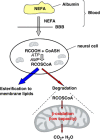Why does brain metabolism not favor burning of fatty acids to provide energy? Reflections on disadvantages of the use of free fatty acids as fuel for brain
- PMID: 23921897
- PMCID: PMC3790936
- DOI: 10.1038/jcbfm.2013.128
Why does brain metabolism not favor burning of fatty acids to provide energy? Reflections on disadvantages of the use of free fatty acids as fuel for brain
Abstract
It is puzzling that hydrogen-rich fatty acids are used only poorly as fuel in the brain. The long-standing belief that a slow passage of fatty acids across the blood-brain barrier might be the reason. However, this has been corrected by experimental results. Otherwise, accumulated nonesterified fatty acids or their activated derivatives could exert detrimental activities on mitochondria, which might trigger the mitochondrial route of apoptosis. Here, we draw attention to three particular problems: (1) ATP generation linked to β-oxidation of fatty acids demands more oxygen than glucose, thereby enhancing the risk for neurons to become hypoxic; (2) β-oxidation of fatty acids generates superoxide, which, taken together with the poor anti-oxidative defense in neurons, causes severe oxidative stress; (3) the rate of ATP generation based on adipose tissue-derived fatty acids is slower than that using blood glucose as fuel. Thus, in periods of extended continuous and rapid neuronal firing, fatty acid oxidation cannot guarantee rapid ATP generation in neurons. We conjecture that the disadvantages connected with using fatty acids as fuel have created evolutionary pressure on lowering the expression of the β-oxidation enzyme equipment in brain mitochondria to avoid extensive fatty acid oxidation and to favor glucose oxidation in brain.
Figures


References
-
- Attwell D, Laughlin SB. An energy budget for signaling in the grey matter of the brain. J Cereb Blood Flow Metab. 2001;21:1133–1145. - PubMed
-
- Clarke DD, Sokoloff L.Circulation and energy metabolism of the brainIn: Siegel GJ, Agranoff BW, Albers RW, Molinoff PB, (eds). Basic Neurochemistry Raven Press: New York; 1994645–680.
-
- Andres RH, Ducray AD, Schlattner U, Wallimann T, Widmer HR. Functions and effects of creatine in the central nervous system. Brain Res Bull. 2008;76:329–343. - PubMed
-
- Bélanger M, Allaman I, Magistretti PJ. Brain energy metabolism: focus on astrocyte-neuron metabolic cooperation. Cell Metab. 2011;14:724–738. - PubMed
Publication types
MeSH terms
Substances
LinkOut - more resources
Full Text Sources
Other Literature Sources

